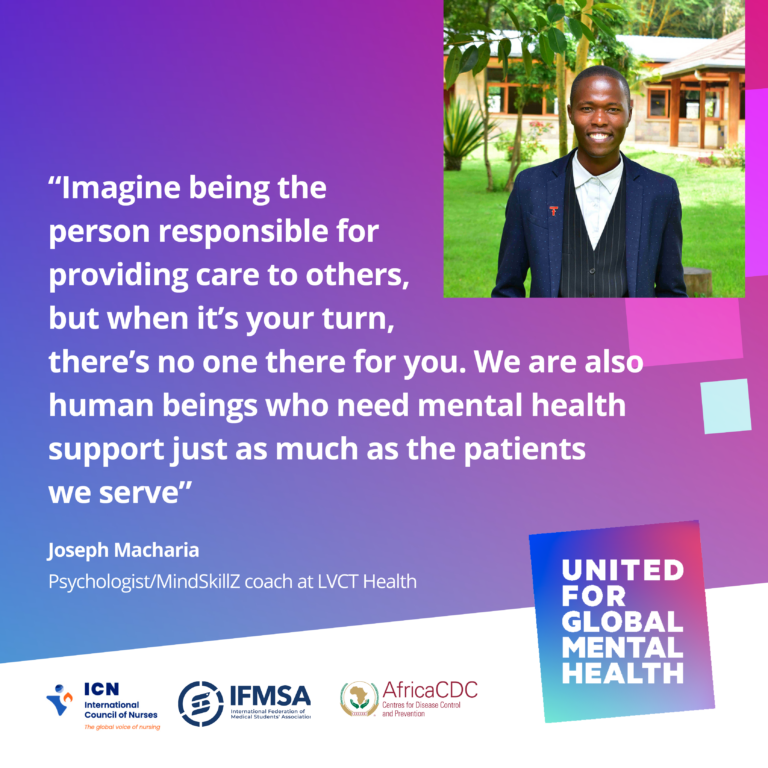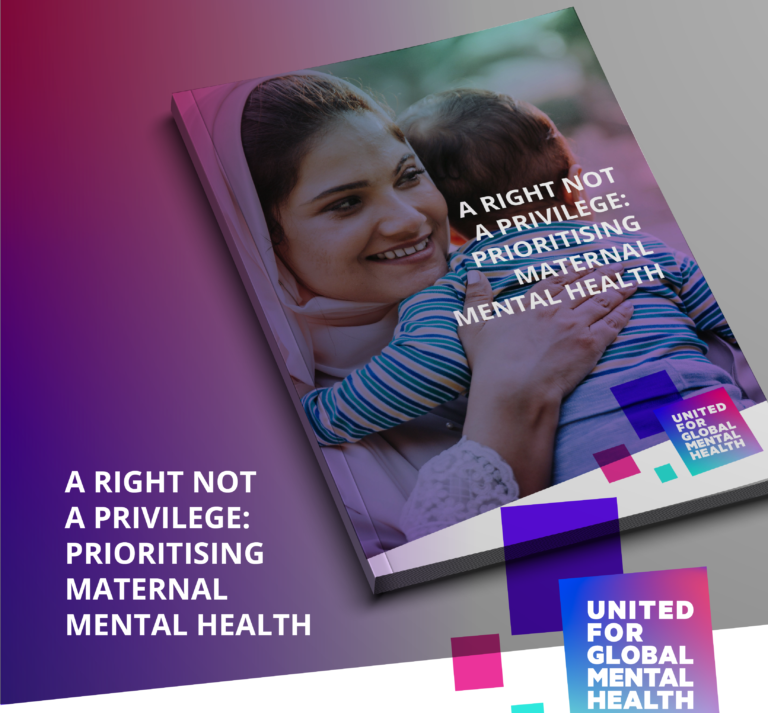WorkForce
Pushing For The Mental Health Workforce The World Needs
The challenge
The world is in urgent need of a well-trained and well-resourced mental health workforce; thus, we are advocating to address the global shortage of mental health professionals, particularly in low- and middle-income countries (LMICs). In many LMICs, the demand for mental health care exceeds the supply of mental health care professionals, widening the mental health treatment gap.
We are working alongside national and regional partners to coordinate efforts to develop a health workforce capable of delivering the mental health care people need, where they need it and when they need it most. To address this gap, we are calling for:
- Training of non-mental health specialists (e.g., primary care providers, maternal care providers, and community health workers) to provide mental health promotion, prevention, care and treatment to expand and strengthen the workforce able to deliver mental health services.
- Governments and their implementing partners to exercise their duty of care to their staff by protecting the mental health of the health workforce
- Championing and celebrating the tireless contributions, commitment and care of the mental health workforce to create an appreciated and empowered mental health workforce.
- Governments and decision-makers to create positive working conditions that encourage health care workers to join the mental health workforce and remain part of it, especially in rural, remote and less developed areas.
Read more about our efforts in our 2024 World Mental Health Day Campaign aimed at prioritising the needs of the Mental Health of the Health Workforce.

Perinatal Mental Health: Our Approach
UnitedGMH has launched a new project on perinatal mental health. Approximately 1 in 5 women will experience a mental health condition during pregnancy or in the year after the birth. Young mothers are at higher risk of developing mental illness especially postpartum depression during the perinatal period compared to their adult counterparts. With our national partners we are advocating for governments to strengthen the perinatal mental health skills and knowledge in the existing health workforce, to transform care for mothers especially young mothers and their newborns.
Our work so far
The Africa Regional Maternal Mental Health Workshop
In November 2025, we came together with national partners from across Africa for a two-day regional Perinatal Mental Health Workshop, a crucial step towards strengthening advocacy for maternal mental health. You can read the summary resource here – ‘Learning Across Borders: a Peer-to-Peer Exchange for Maternal Mental Health Advocacy in Africa‘
Launch of Maternal Mental Health Advocacy Brief

On World Maternal Mental Health Day (May 7th), in collaboration with our three national partners Africa and Population Health Research Centre, Foundation for Mother and Child Health (FMCH) Indonesia – Indonesia and the Carter Centre team in Liberia we launched a maternal mental health advocacy brief entitled ‘‘A Right Not A Privilege: Prioritising Maternal Mental Health’’.
This advocacy brief underscores that maternal mental health conditions during the perinatal period are preventable and treatable. Countries need to invest in practical tools and interventions to prevent and treat them. The brief shares examples of practice from three countries, Indonesia, Kenya and Liberia, highlighting:
- the importance of data for identifying mothers at risk and women who need mental health support;
- that age-appropriate interventions are necessary for reaching adolescent mothers
- and that maternal mental health interventions can be delivered by well-trained non-specialist health workers.
These interventions offer a valuable learning opportunity for other countries in similar settings. The brief also offers practical recommendations for governments and development partners to prioritise maternal mental health, strengthen the primary and community care workforce’s perinatal mental health skills and integrate perinatal mental health into maternal and child health services.
Link to the advocacy brief: https://buff.ly/mBDICwK
Webinars and knowledge exchange sessions
On World Health Day, in collaboration with the Global Health Council, we hosted a webinar on Perinatal Mental Health. The webinar offered an insightful discussion on the global burden of perinatal mental health, highlighted national level examples of good practice and the voice of women with lived experience and called to improve and optimise perinatal mental health care. We heard from experts representing different global and national organisations including Global Alliance for Maternal Mental Health, African Population and Health Research Center, Foundation for Mother and Child Health, Indonesia, the Ministry of Health of Liberia, and StrongMinds Uganda.
Key takeaways:
- Strong data is important to increase finances for maternal mental health.
- The need for perinatal mental health interventions among adolescent mothers is high.
- We need to strengthen the perinatal mental health skills and knowledge in the existing primary and community health workforce
- We need to integrate perinatal mental health into maternal and child health services
A link to the webinar can be found here.
We collaborated with the Global Mental Health Action Network (GMHAN) Secretariat to host a knowledge exchange session on perinatal mental health as part of their #MHForAll webinar series. Expert speaker Dr Alain Gregoire, Consultant Specialist in Perinatal Psychiatry and Founder of the Global Alliance for Maternal Mental Health presented the case for building strong alliances to improve maternal mental health and the well-being of future generations, and discussed how alliances can be created to drive meaningful change in this space.
Launching an online campaign to amplify the voices of women with lived experience
We partnered with our national partners, the Africa and Population Health Research Centre, the Foundation for Mother and Child Health (FMCH) Indonesia, and the Carter Centre team in Liberia and our long-term international partner, UNICEF, to launch the online campaign: Maternal Mental Health: A right not a privilege OUR VOICE.
Our campaign underscores that maternal mental health conditions during the perinatal period are preventable and treatable. Through the voices of women with lived experience and the front-line workforce supporting these women, the campaign amplifies their unique experiences and urgent calls to action. And our co-authored blog with UNICEF positions maternal mental health within the wider maternal health agenda.
To find out more about the campaign and our calls to action please see the campaign website: https://unitedgmh.org/maternal-mental-health-a-right-not-a-privilege-our-voices/
What’s Next
Resources
- Mental health ATLAS 2024 – WHO (2024)
- Global strategy on human resources for health: Workforce 2030 –WHO (2020)
- Guide on integration of perinatal mental health in maternal and child health services– WHO (2022)
- The maternal MH experience of young mothers (2023) – Maternal Mental Health Alliance & Children and Young Peoples Mental Health Coalition
- A Right Not A Privilege: Prioritising Maternal Mental Health (2025)
- Maternal Mental Health: A Right Not A Privilege – Our Voices
- Learning Across Borders: a Peer-to-Peer Exchange for Maternal Mental Health Advocacy in Africa (2025)